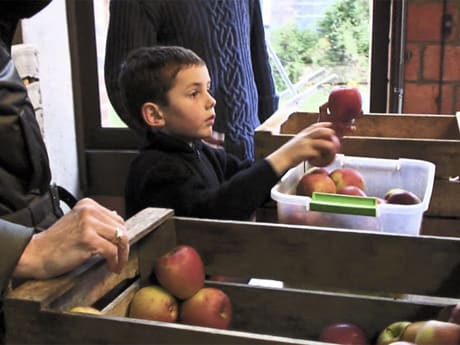According to the latest documentary from feminist French filmmaker Coline Serreau, Good Food, Bad Food, if we don't change the way we produce our food and handle the environment immediately, we're all going to die within the next 50 years. Now panic!
Yes, this is yet another enviro-doc using scare tactics to convert the weak of mind, preaching mainly to those already in accord by passionately presenting a specific ideologue. But this doesn't mean that it doesn't have some good points leading up to its all-encompassing "act now" mantra and idealistic vision of taking down multinationals via a global boycott. It just means that anyone in a different headspace with a rudimentary ability to discern might snicker at some of the disturbingly broad generalizations used to careen from point A to B.
Appropriately, things start with the formation of pesticides around WWI, suggesting that the creation of chemical, machine-based farming and the concept of economy was ostensibly the death of feminine agriculture. Wisely, they observe that the process of creating food became less about global sustainment and more about generating revenue for those in positions of power.
It goes from here to the notion of family farming and the open exchange of pesticide-free seeds, showing the successful examples of autonomy while elaborating on the many ways that petroleum- and pesticide-based industries – and industry in general – have tried to quash any efforts at organic farming. Some discussion is had about natural pesticides and modes of rejuvenating dying land, but mostly it's endless bitching about differing perspectives and the occasional musical interlude with cows eating.
Amidst the veritable parade of talking heads, including co-op owners, autonomous farmers and scientists, Indian physicist Vandana Shiva represents the thematic vein and main problem of this documentary most clearly, equating male industry with the seeming destruction of the planet, eventually connecting it to the slaughtering of female babies in India.
We understand what she's trying to say, but based on her supercilious mode of argument and broad tendency to connect things without factoring in a variety of signifiers, it's difficult to jump on board without pause.
(Mongrel Media)Yes, this is yet another enviro-doc using scare tactics to convert the weak of mind, preaching mainly to those already in accord by passionately presenting a specific ideologue. But this doesn't mean that it doesn't have some good points leading up to its all-encompassing "act now" mantra and idealistic vision of taking down multinationals via a global boycott. It just means that anyone in a different headspace with a rudimentary ability to discern might snicker at some of the disturbingly broad generalizations used to careen from point A to B.
Appropriately, things start with the formation of pesticides around WWI, suggesting that the creation of chemical, machine-based farming and the concept of economy was ostensibly the death of feminine agriculture. Wisely, they observe that the process of creating food became less about global sustainment and more about generating revenue for those in positions of power.
It goes from here to the notion of family farming and the open exchange of pesticide-free seeds, showing the successful examples of autonomy while elaborating on the many ways that petroleum- and pesticide-based industries – and industry in general – have tried to quash any efforts at organic farming. Some discussion is had about natural pesticides and modes of rejuvenating dying land, but mostly it's endless bitching about differing perspectives and the occasional musical interlude with cows eating.
Amidst the veritable parade of talking heads, including co-op owners, autonomous farmers and scientists, Indian physicist Vandana Shiva represents the thematic vein and main problem of this documentary most clearly, equating male industry with the seeming destruction of the planet, eventually connecting it to the slaughtering of female babies in India.
We understand what she's trying to say, but based on her supercilious mode of argument and broad tendency to connect things without factoring in a variety of signifiers, it's difficult to jump on board without pause.




